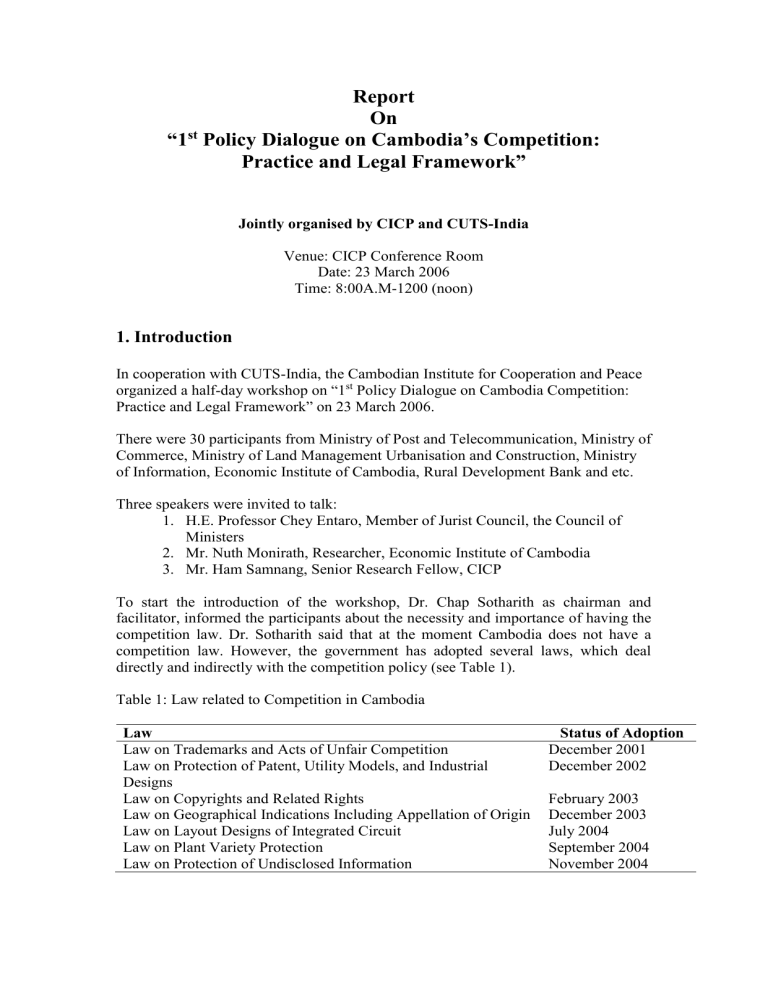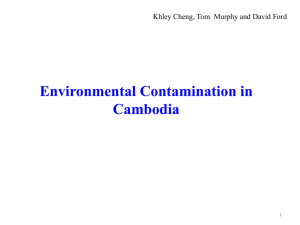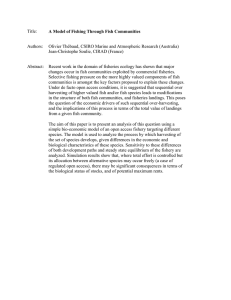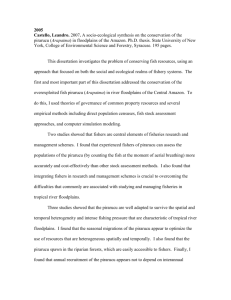Report On “1 Policy Dialogue on Cambodia’s Competition:

Report
On
“1
st
Policy Dialogue on Cambodia’s Competition:
Practice and Legal Framework”
Jointly organised by CICP and CUTS-India
Venue: CICP Conference Room
Date: 23 March 2006
Time: 8:00A.M-1200 (noon)
1. Introduction
In cooperation with CUTS-India, the Cambodian Institute for Cooperation and Peace organized a half-day workshop on “1 st
Policy Dialogue on Cambodia Competition:
Practice and Legal Framework” on 23 March 2006.
There were 30 participants from Ministry of Post and Telecommunication, Ministry of
Commerce, Ministry of Land Management Urbanisation and Construction, Ministry of Information, Economic Institute of Cambodia, Rural Development Bank and etc.
Three speakers were invited to talk:
1.
H.E. Professor Chey Entaro, Member of Jurist Council, the Council of
Ministers
2.
Mr. Nuth Monirath, Researcher, Economic Institute of Cambodia
3.
Mr. Ham Samnang, Senior Research Fellow, CICP
To start the introduction of the workshop, Dr. Chap Sotharith as chairman and facilitator, informed the participants about the necessity and importance of having the competition law. Dr. Sotharith said that at the moment Cambodia does not have a competition law. However, the government has adopted several laws, which deal directly and indirectly with the competition policy (see Table 1).
Table 1: Law related to Competition in Cambodia
Law
Law on Trademarks and Acts of Unfair Competition
Law on Protection of Patent, Utility Models, and Industrial
Status of Adoption
December 2001
December 2002
Designs
Law on Copyrights and Related Rights February 2003
Law on Geographical Indications Including Appellation of Origin December 2003
Law on Layout Designs of Integrated Circuit July 2004
Law on Plant Variety Protection
Law on Protection of Undisclosed Information
September 2004
November 2004
2. Presentations
Followings are points of discussion:
H.E. Professor Chey Entaro
He provided a general overview on the globalisation, world competition and the implication of China accession into the WTO. Professor Entaro pointed out that
Cambodia has gone through several regime changes in the past 2 decades, which also changed the shapes of Cambodia’s economic market system. Now Cambodia adopts free economic market system, according to the constitution, he said. He said if there is no competition there is no quality of goods. Competition can promote economic growth and production, Mr. Entaro said. Services cost and legal framework and justice are very important components of the competition, he added. Thus, everyone including businessmen and investors has a role to play in helping the government to make the law and policy on the competition, Mr. Entaro said. The government also has to facilitate the smooth competition by implementing the existing laws.
Mr. Nuth Moniroath
He presented his paper on “Competition Policy and Law in Cambodia”. He described about market structure and competition, sectoral policy, consumer policy, perspectives on competition policy and the way forward. Mr. Monirath also touched upon the barriers to competition in the markets, which include complicated business registration, lack of transparency and accountability, weak institution and governance.
On sectoral policies, Mr. Moniroath cited 3 major sectors such as electricity, telecommunications and banking. According to his research finding, Cambodia has low capacity of power generation and electrical grid, limited access and very high costs, Mr. Moniroath said. There are now 7 distribution companies, 7 generation companies, 69 private companies and the government-joint venture with French EDC.
On the electricity law, Mr. Monirath said the application of monopoly regime seems to contradict with the initial aims of the law and there is absence of clear criteria for licensing. On Telecommunication, Mr. Moniroath stressed that Cambodia is one of the countries in Southeast Asia that has the lowest level of information and communication technology, limited access and high costs. There are only 3 fixed line providers, 4 mobile phone companies and 4 ISPs providers and there is no clear legal provision governing licensing procedures in the telecommunications sector, Mr.
Moniroath added. With regard to banking, there are 14 commercial banks, 3 specialized banks, 9 licensed micro-finance institutions, 27 micro-financed NGOs, and about 60 unregistered NGOs- running credit system, according to Mr. Moniroath.
Despite banking plays important role in facilitating the finance, there is absence of regulations and procedures that limit the scope of competition in this sector, for instance, merger and acquisition and business diversification. Cambodia does have a competition policies and law which deal directly and indirectly with the competition issue. However, there is limited consumer awareness about safety and quality of the products and the weak enforcement of consumer protection laws and regulations. Mr.
Monirath concluded that Cambodia should have appropriate competition policy and legislation, proper sectoral policies, competent competition authority, effective and efficient and independent judiciary bodies.
Mr. Ham Samnang
He delivered his presentation on “Competition Concerns in the Fisheries Sector in
Cambodia.” Mr. Samnang said there have been concerns in the fisheries sector when it comes to competition, as there have been several constraints in this sector. He pointed out several major constraints which hinder the competition that include the ambiguity and restriction of the fisheries law and other regulatory framework that limit the fishing gear and access to fisheries by all types of fisheries operators.
According to the law, not all types of fisheries are allowed to be caught, Mr. Samnang said. Fishers are not allowed to fish in the closed season, which is usually between 1
June and 31 October. Cambodia’s fisheries law classifies fishers into 3 types: familyscale or subsistent fisher, medium-scale and large-scale fishers. Subsistent fisher is allowed only to catch enough fish to feed their family member, not for sales, according to the 1987 fisheries law, which is enacted now.
With regards to fisheries sales, there have been some major constraints stemming from a lack of financing support, lack of market information, lack of good technique to maintain quality of fish, monopoly in the fisheries distribution and lack of transparency and corruption, according to Mr. Samnang. Lack of financing support forced fishers and fish traders who were in debt to fish distributors to sell their fish with low or at the discounted price. Fish distributors lent their money to fish traders to buy fish and fish traders lent part of the money to fishers who needed the money to buy fishing gear or some other staff. As the result, fishers had to sell their catch to fish trader and fish trader had to re-sell the fish to their moneylenders. According to a study made by CDRI on fish export, fish exporter/trader had to make 27 fee payments to 15 institutions in 16 locations along the road from Tonle Sap Great Lake to Thai
Long Koeur market at Cambodia-Thai border. The same study points out that to export fish from the Great Lake to Thai Long Koeur market, exporters pay less if they do not follow the law and regulation, according to Mr. Samnang. He said to export 3.1 tonnes of fish, officially exporter pays US$681 but unofficial payment was just
US$236. Mr. Samnang concluded that the government should redefine and update the laws, consider equal access to fisheries by all categories of operators, update restricted and permitted fishing gear and eliminate corruption and unnecessary fees.
3. Discussion
Dr. Chap Sotharith posed 3 important questions to speakers and to the forum to start the discussion. The first question was whether monopoly should be given to some special sector with limited period of time. The second was about price fixing. Is there any price fixing on the goods sold in Cambodia? Third, about price discrimination.
Some Cambodian tourist sites charge local and foreign people differently, for example
Angkor Wat which charges foreigner $25 and local free of charge, can foreigner file a complaint against this price discrimination?
On the first question, Mr. Moniroath said the State has to evaluate whether to give monopoly of one sector to one company and the profit it can make from this monopoly and see how many jobs it can provide to the people. The State has to clearly adopt its taxation policy.
Mr. Samnang said as Cambodia has now joined WTO the monopoly matter seems to be impossible, as the WTO rules require all members to compete in a fair environment. Choosing between competition and monopoly, Mr. Samnang said
Cambodia should adhere to competition because it gives consumers freedom to make decision on the products, provides modern technology and cheap price.
On the second question, Mr. Samnang said according to his research on fisheries price fixing seems to exist already as he explained in his presentation that fishers and fish traders are in debt to fish distributors who bought the fish with the price that was already negotiated. On the other hand, fishers lack market information, which prevents them from making any decision when they want to sell their fish.
On the third question, Mr. Moniroath said this type of price discrimination is not called unfair competition. Competition exists in the market, Mr. Moniroath said. This practice is in some countries in the world where they charge children, students or old people differently.
Another question was posed by one of the participants about who will decide how much they sell their products. Mr. Moniroath said according to the economic theory, the supplier and the consumers (demand) would decide the price of the products.
When there are more suppliers the price of the produce will decrease. On the contrary, when there are more consumers the price will also increase.
To make a good competition law, there is a suggestion that there must be participation from various know-how people especially from members of the parliament who should have knowledge about the importance of this law.
4. Conclusion
Competition policy is still a new concept for a post-conflict countries including
Cambodia where there is still limited knowledge and lack of legal framework in this area. Cambodia does have a few policies and laws, which involve directly and indirectly with competition. However, it is not enough. The country still needs a good competition law including antitrust law, which will promote an environment of free and fair businesses.
At present, Cambodia’s competition law is being studies and drafted by the Ministry of Commerce and it will require some time to have the law debated and approved by the Government and the National Assembly. Most of the participants seem to have poor knowledge about the competition and the competition law. More workshops and training should be conducted in this area.




